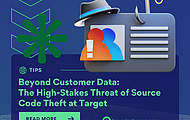Beware of ClickFix Scams: How Fake Errors Can Lead to Real Cyberattacks

Cybercriminals are continuously improving their strategies to take advantage of gullible users in today's digital environment. One of their most recent tactics is a fraudulent operation called "ClickFix," which tricks people into downloading dangerous software while pretending to fix fake technical problems. Protecting organizational and personal data requires knowing how these scams work and how to avoid them.
What Is ClickFix?
ClickFix scams involve fraudulent pop-up messages or alerts that mimic legitimate system errors or software warnings. These messages often claim a device or application is compromised, urging the user to act immediately by clicking a link or downloading a “fix.” For example, a pop-up might falsely warn of a corrupted driver, a virus infection, or an expired software license. The goal is to create panic, prompting quick action without scrutiny.
How the Scam Unfolds
Cybercriminals use sophisticated social engineering techniques to make these alerts appear authentic. The messages might include official-looking logos, urgent language, or even fake countdown timers to heighten anxiety. Once a user clicks the provided link, they’re directed to a malicious website and instructed to download a tool that supposedly resolves the issue. Instead, the downloaded file installs malware, such as ransomware, spyware, or trojans, onto the victim’s device. This malware can steal sensitive data, encrypt files for ransom, or grant attackers remote access to systems.
The Risks of Falling Victim
ClickFix-driven malware can have severe consequences. Ransomware locks users out of their devices until a payment is made, while spyware silently harvests passwords, financial details, or other confidential information. Trojans may create backdoors for future attacks, leading to prolonged security breaches. Beyond financial losses, such incidents damage reputations and erode trust, particularly for businesses.
How to Protect Yourself
- Verify Error Messages Legitimacy: Legitimate software rarely uses alarming pop-ups to communicate issues. Close unexpected warnings via the task manager instead of interacting with them.
- Avoid Unsolicited Downloads: Never download software from unverified sources. Use official vendor websites or app stores.
- Install Robust Security Software: A reputable antivirus program can detect and block malicious sites or downloads.
- Keep Systems Updated: Regular updates patch vulnerabilities that scammers might exploit.
- Educate Teams and Family: Teach others to recognize phishing attempts and suspicious alerts.
Stay Secure with Bayon Technologies Group
Cyberattacks like ClickFix scams underscore the importance of proactive cybersecurity measures. At Bayon Technologies Group, we specialize in comprehensive protection tailored to your needs. Our solutions include advanced threat detection, employee training programs, and cutting-edge tools to neutralize risks before they escalate. Don’t wait for a breach to take action—partner with us to build a resilient defense against evolving digital threats.
Stay vigilant, stay informed, and let Bayon Technologies Group empower your journey toward a safer digital future.
‹ Back







